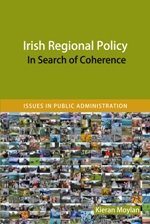 The context for regional development is constantly being reshaped by the globalised economic system, which affects regions differently, with the attendant risk that disparities will widen. Irish Regional Policy: In Search of Coherence examines the coherence of Irish regional policy in this evolving context. It develops and applies a model of policy coherence to Irish regional policy in relation to investment planning processes, spatial planning and territorial governance.
The context for regional development is constantly being reshaped by the globalised economic system, which affects regions differently, with the attendant risk that disparities will widen. Irish Regional Policy: In Search of Coherence examines the coherence of Irish regional policy in this evolving context. It develops and applies a model of policy coherence to Irish regional policy in relation to investment planning processes, spatial planning and territorial governance.
The dominant regional economic growth theories and the influential concepts of territorial cohesion, regional competitiveness and polycentric spatial development are critically reviewed. The rationale for regional policy is re-examined; a typology of regional policy interventions and territorial governance arrangements is outlined, and its relevance to Ireland is assessed.
Irish Regional Policy: In Search of Coherence combines an analysis of documentary sources and statistical trends with the outcomes of 24 interviews with leading personnel in four categories - government departments and agencies, subnational public bodies, selected academic experts and social partner bodies - all of whom are active players in regional policy development, implementation and evaluation processes.
Among the key findings are that regional policy goals are subsidiary to national goals and that Irish regional policy lacks coherence with related policies. The study finds a need for an enhanced role for region-level bodies that would greatly improve the territorial co-ordination of sectoral policies. It concludes that the policy coherence framework is a useful one that could be applied more generally in reviewing public policies.
- Introduction
Regional development context
Research hypothesis
Research aim and objectives
Methodology
Main findings and conclusions
Utility of the study
Structure
- Regional Economic Growth and Regional Policy
Regional economic growth theories
Measurement of regional performance and convergence
Influential concepts: Territorial cohesion, polycentric urban development and competitiveness
Do regions matter? The case for regional policy
A typology of regional policies
Policy coherence and policy effectiveness
Chapter conclusions
- Methodology
Research philosophy
Research strategy
Research methods
Design of research instrument and selection of interviewees
Organisation of interviews
Data analysis
Ethics, confidentiality and position of researcher
Ensuring the quality of the research
Chapter conclusions
- Regional Development Policy in Ireland
Evolution of Irish regional policy
National Development Plans and the National Spatial Strategy
Selected sectoral strategies
Sources of regional divergence in Ireland Regional socioeconomic trends
Chapter conclusions
- Findings and Discussion
Rationale for Irish regional policy
Current goals and principal features of Irish regional policy
Effectiveness of Irish regional policy
Convergence and divergence forces
Preferred goals and influential policy drivers
Measurement
Investment planning and investment strategies
Spatial planningTerritorial governance
Role of regional bodies
Chapter conclusions
- Summary, Conclusions and Recommendations
Summary of findings by theme
Conclusions and implications for Irish regional policy
Coherence of Irish regional policy
Recommendations
Limitations of this study
Areas for further research
Concluding comments
Bibliography
Glossary
Appendix 1: List of Interviewees
Appendix 2: Interview Guide
Appendix 3: Letter to Interviewees
Index